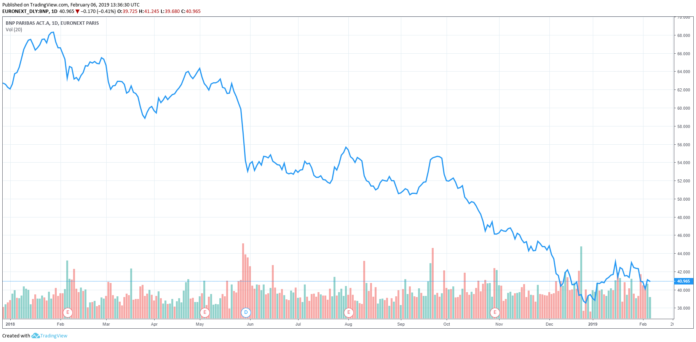[ad_1]
With newly released data showing slower growth in the euro-zone, the struggle of Deutsche Bank, and BNP Paribas cutting $683 million in expenses, the euro may be in deep trouble.
In the last quarter of 2018, a period in which even U.S. banks underperformed, the global markets division of BNP Paribas recorded a $256 million loss.
BNP Paribas, the largest bank in France, ended 2018 with a staggering 40 percent loss in trading according to FT.
Extreme Market Movements, Euro is Declining
Since early January, against the U.S. dollar, the value of the euro fell from $1.23 to $1.14.
A report from The Economist suggested that the euro-zone economy as a whole is slowing down and the European Central Bank (ECB) are exploring ways to stimulate the market.
Initially, analysts at major banks and consultancy firms forecasted the slowdown of the euro-zone economy to be a short-term trend.
In early 2018, Germany, the largest economy in Europe by GDP, was attributed as the main factor fueling the deceleration of growth in the euro-zone.
The unexpectedly poor performance of Deutsche Bank and BNP Paribas, the worst of its kind since 2013, have surprised investors in the financial markets in Germany and France who already expected a weak fourth quarter. It further intensified the concerns toward the outlook of the euro-zone economy.
Jefferies analyst Maxence Le Gouvello Du Timat told FT:
A big miss in markets across FICC and equities… the worst performance in both since 2013. “The repositioning in investment banking is rational and further cost cutting should be taken well, accounts for 2.5 per cent of the 2018 cost base.
Most banks in Europe have recorded double-digit drops in overall trading income in the second half of 2018.
Earlier this week, after Deutsche Bank announced its revenue declined by 23 percent in fixed income trading, analysts said that it is difficult to see a future for Germany’s biggest commercial bank.
“I can hardly see a future for Deutsche Bank as long as there’s no radical change of strategy. It’s hard to see how they’re going to raise revenue and cost cuts are going too slowly,” Fairesearch analyst Dieter Hein said.
With France, the U.K. and Germany, the three leading economies in Europe, struggling to adjust to worsening market conditions, analysts foresee the euro having a dismal performance against the U.S. dollar and other reserve currencies throughout 2019.
Some strategists such as Russel Napier, an independent market strategist at ERIC, expect the euro-zone economy to weaken to a point in which the U.K. could appeal to investors as a potential safe haven market.
Napier wrote:
The UK, where democracy and the rule of law will remain largely unchallenged, will become an attractive safe-haven investment for European investors facing increasingly authoritarian regimes and property sequestration on the mainland.
BNP Paribas Shocking Performance Surprised Investors
Investors in Europe were not taken aback by the fact that BNP Paribas recorded a substantial quarterly loss. That was expected.
Investors were surprised by the magnitude of the drop in the revenues of the leading French bank in major areas of the business.
On February 5, Bloomberg reported that the slump in Italy’s economy, the fourth largest in Europe, slipped into recession in the fourth quarter of 2018, leading all four of Europe’s biggest economies to face a rapid decline in economic activities.
In a period wherein major conglomerates and factories all across Europe are initiating large cuts that may drastically increase the unemployment rate in the euro-zone, the European Central Bank’s role in the upcoming 10 months will be crucial in recovering the euro-area before the year’s end.
Solely based on the performance of financial institutions in Germany and France, analysts forecast the euro weakening throughout the upcoming quarters.
[ad_2]
Source link
